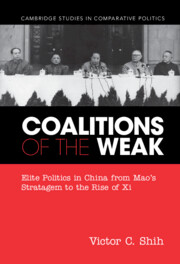Refine search
Actions for selected content:
3 results
2 - Coalition of the Strong
-
- Book:
- Coalitions of the Weak
- Published online:
- 26 May 2022
- Print publication:
- 02 June 2022, pp 35-54
-
- Chapter
- Export citation

Coalitions of the Weak
-
- Published online:
- 26 May 2022
- Print publication:
- 02 June 2022
5 - The 1960s
- from Chapter 5 – 1960s
-
-
- Book:
- The Chinese Communist Party
- Published online:
- 06 May 2021
- Print publication:
- 06 May 2021, pp 91-124
-
- Chapter
- Export citation
